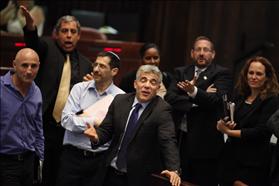Update from the Knesset's Winter Session
Israel's religion and state conflict take the Knesset's winter session by storm
Knesset lawmakers are starting up the winter session right where they left off; equality in sharing the burden, accesibility of religious services, and public transportation on shabbat were immediately addressed as top priority issues.
16/10/2013 15:17
Tags: religion and state · public transportation · freedom of marriage · equality in sharing the burden · Knesset

The Minister of Finance Yair Lapid at the Knesset gathering where the State's budget was approved in the second and third reading, for the years 2013 - 2014 (b). 29-07-2013. Photo: Flash 90
Along with the Iranian nuclear threat and the Israeli-Palestinian peace process, religion and state issues took the spotlight in the Knesset's opening session of the winter term. Several of the cabinet members spoke specifically about their dedication to a variety of issues relating to Israel's religious status quo, vowing to initiate effective change on several key fronts. Some of the most significant topics that were discussed were the Chief Rabbinate's bureaucratic structure, freedom of marriage, Shabbat, equality in sharing the burden, and better representation of women on electoral committees.
Hiddush's systematic polling conducted before and after the January 2013 Knesset elections showed that Israel's religion and state conflict played a central role in influencing Israeli voter behavior. Much of Yair Lapid and Yesh Atid's success in the elections came as a result of the amount of attention they dedicated to civil issues, including freedom of marriage and equality in sharing the burden during the campaign season. These complex issues were discussed and grappled in the first six months of the 19th Knesset, but there were very few conclusive results. Israel's policymakers will most likely dedicate a significant amount of time and effort to these pressing issues which are clearly on the mind of the Israeli public.
Israel's policymakers will most likely dedicate a significant amount of time and effort to these pressing issues which are clearly on the mind of the Israeli public.
Prime Minister Benjamin Netanyahu discussed the Equality in Sharing the Burden law as one of the three most important issues that the government coalition must pass (along with the peace process and electoral reform). Netanyahu said, "“I will try to reach an agreement with the party heads in the coalition that will enable us to pass the bills, either together or in stages…[These bills] must be passed because they are important to the people of Israel. We are back with new energy to work for Israel’s citizens.”
Finance Minister Yair Lapid announced in the Knesset plenum that his party, Yesh Atid would continue to promote a bill to allow public transportation on Shabbat, saying,"Public transportation should be allowed on Shabbat on main roads in secular areas…We will not do this in religious areas. This is a social thing and is not, heaven forbid, anti-religious. This is to fix the current situation in which the rich grandfather gets to visit his grandchildren on Shabbat mornings where as the less well-off grandfather cannot." Lapid also renewed his support for other crucial issues, such as freedom of marriage and equality in sharing the burden.
Justice Minister Tzipi Livni announced that she will be promoting a number of bills that pave the way for greater freedom of religion and equality in Israel. Two of the most significant bills she mentioned including reforming religious services (Israelis would be able to register anywhere in the country for religious services) and requiring couples to sign a prenuptial agreement before marriage in order to avoid more cases of agunot (women whose husbands will not grant them a divorce).
Livni also spoke about the need to ensure better representation of women on electoral committees and councils that select municipal rabbis. She is promoting a bill that will require 40% of the selection council for municipal rabbis to be women and have at least one female member sit on electoral committees.